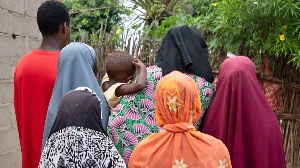- Home - News
- Elections 2024
- News Archive
- Crime & Punishment
- Politics
- Regional
- Editorial
- Health
- Ghanaians Abroad
- Tabloid
- Africa
- Religion
- Photo Archives
- Press Release
General News of Tuesday, 25 March 2025
Source: www.ghanawebbers.com
'I scarred my 6 children by using skin-lightening creams'
A mother in northern Nigeria is upset. She holds her two-year-old child, who has burns and discolored skin on his face and legs.
The 32-year-old used skin-whitening products on all six of her children. Family pressure led her to this decision, which she now regrets.
Fatima, a pseudonym to protect her family's identity, shares that one daughter covers her face to hide burns. Another daughter has darker skin with a pale circle around her eyes. A third child has whitish scars on her lips and knees.
Her toddler still has weeping wounds that are healing slowly.
Fatima explains that her sister's light-skinned children received more affection from their grandmother. This favoritism hurt Fatima deeply.
She bought creams at a local supermarket in Kano without a doctor's prescription. One daughter developed marks on her lips from using these creams.
Initially, the creams seemed effective. The grandmother began to warm up to Fatima's children, aged two to 16 at the time. However, burns and scars soon appeared.
Skin-whitening or lightening is common in Nigeria for cosmetic reasons but has deep cultural roots. According to the UN World Health Organization (WHO), 77% of Nigerian women use these products regularly.
In comparison, 66% of women in Congo-Brazzaville use them, while Senegal reports 50%, and Ghana 39%. These creams may contain harmful substances like corticosteroids or hydroquinone.
Some products include mercury and kojic acid, which can be toxic. Possible side effects include dermatitis, acne, skin discoloration, and kidney damage.
The WHO warns that prolonged use can thin the skin and delay healing from wounds. In response to this crisis, Nigeria's National Agency for Food and Drug Administration and Control (NAFDAC) declared an emergency in 2023.
It is becoming more common for mothers like Fatima to bleach their children’s skin. Zainab Bashir Yau runs a dermatology clinic in Abuja. She estimates that 80% of women she meets have bleached their children or plan to do so.
Many women were also bleached as babies themselves and continue the practice today. A common sign of skin-lightening is dark knuckles; other parts of hands or feet become lighter while knuckles remain dark.
However, smokers or drug users may also have dark patches on their hands due to smoke exposure. This leads some people to mistakenly assume users of bleaching products are drug addicts.
Fatima says this happened to her daughters aged 16 and 14 years old. They faced discrimination because others labeled them as drug addicts based on their appearance.
This stigma affected their social lives; they lost potential fiancés who did not want association with them due to these assumptions.
I visited a market in Kano where "mixologists" create skin-whitening creams from scratch. The market features many shops selling thousands of these creams.
Customers can choose raw ingredients or buy pre-mixed varieties off shelves. I noticed some bleaching creams marketed for babies contained regulated substances.
Some sellers admitted using harmful ingredients like kojic acid and hydroquinone despite knowing the risks involved. I saw teenage girls buying bleaching creams both for personal use and resale among peers.
One woman with discolored hands insisted on adding a lightening agent meant for adults into cream for her children despite its illegality for minors' use.
She believed nothing would happen to her kids because she had used the wrong product herself before without issues.
Most customers wanted their babies' skin "to glow" or look "radiant." Many seemed unaware of approved dosages for safe usage.
One seller mentioned he often exceeded recommended limits when mixing creams based on customer requests.
The approved dosage of kojic acid in Nigeria is only 1%, according to NAFDAC guidelines.
I even witnessed salesmen offering injections as part of their services.
Dr Leonard Omokpariola from NAFDAC stated efforts are underway to educate people about risks associated with these products.
He mentioned ongoing raids at markets aimed at seizing harmful ingredients entering Nigeria through borders.
However, identifying unregulated substances can be challenging since they often come unlabelled.
Fatima feels regret over her actions if her children's scars do not fade away eventually.
When she confided in her mother about using those creams, it caused sadness after learning about potential dangers faced by grandchildren.
Fatima aims now to help other parents avoid similar mistakes through sharing her experience.
"Even though I have stopped...the side effects remain," she urges other parents not repeat what she did."











